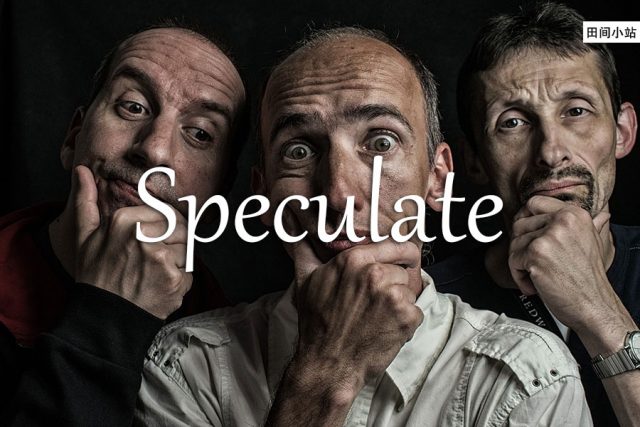本文经授权转载自微信公众号:田间小站

考研 CET6 IELTS TOEFL TEM8 GMAT
外刊例句
- But others speculate that the president was in a funk after his trip to China failed to yield a new loan for the next phase of Kenya’s ambitious $10bn railway.
但其他人猜测总统访华后陷入了恐慌,因为他没能为肯尼亚雄心勃勃、投资100亿美元的铁路项目的下一阶段拿到新贷款。
——《经济学人》 - Some pundits speculate that many computers are obsolete before they’re even designed, which goes a long way toward explaining why the ATM at my grocery store never works.
有些专家推测,许多电脑在被设计出来之前就已经过时了,这个原因颇能够解释为什么在我买东西的那家日用品商店里的自动提款机从来没有正常过。
——《时代周刊》
基本释义
[verb] form a theory or conjecture about a subject without firm evidence
[动词] 在没有确凿证据的情况下对某个对象形成理论或猜测
深入解读
Speculate 是一个与小站(微信公众号:田间小站)之前推送过的 immaculate 有着相同结尾的单词。该词逆构自名词 speculation (猜测;投机),于16世纪末出现在英语中后,先是作动词表示“猜测、推测、推断”,主要指在前提不确定或数据不完整等不具备确凿证据的情况下,对某个对象推理形成假设性或理论性的结论,常用搭配 speculate about/on sth ,比如:
- 他的突然辞职令同事们不知所措。我们大家都推测过他辞职的原因。
His sudden resignation put his colleagues in a spin. We all speculated about the reasons for his resignation. - 医生们推测他死于头部受击引起的脑溢血。
The doctors speculate that he died of a cerebral haemorrhage caused by a blow on the head.
除了猜测原因以外,人们也常常推测结果。特别是推断出市场上某个买卖将会产生利润后,就会把握机会进场交易。因此等到了1785年后, speculate 也随着 speculation 开始用来表示“投机、做投机买卖”,主要指冒着亏损的风险,购买商品、股票、房地产等风险投资,期望以更高的价格再次出售,从而赚取利润,常用搭配 speculate in/on sth ,比如:
- 他靠在伦敦黄金市场和白银市场上做投机生意发了财。他有做生意的天分。
He made his money speculating on the London gold and silver markets. He had a natural flair for business. - 大农场主正在不断涌进来,不是为了耕作,而是要利用不断上涨的地价进行投机。
Big farmers are moving in, not in order to farm, but in order to speculate with rising land prices.
名著用例
Savannah buzzed behind its doors and speculated about Philippe Robillard, who had gone West, but the gossiping brought no answer.
整个萨凡纳都在暗中纷纷议论,并猜测如今到西部去了的菲利普·罗毕拉德是怎么回事,可是闲谈归闲谈,谁也没有找到答案。
出自美国作家玛格丽特·米切尔(Margaret Mitchell)创作的长篇小说《飘》(Gone with the Wind)。
同近义词
- conjecture: form an opinion or supposition about (something) on the basis of incomplete information
- surmise: suppose that something is true without having evidence to confirm it
- postulate: suggest or assume the existence, fact, or truth of (something) as a basis for reasoning, discussion, or belief
